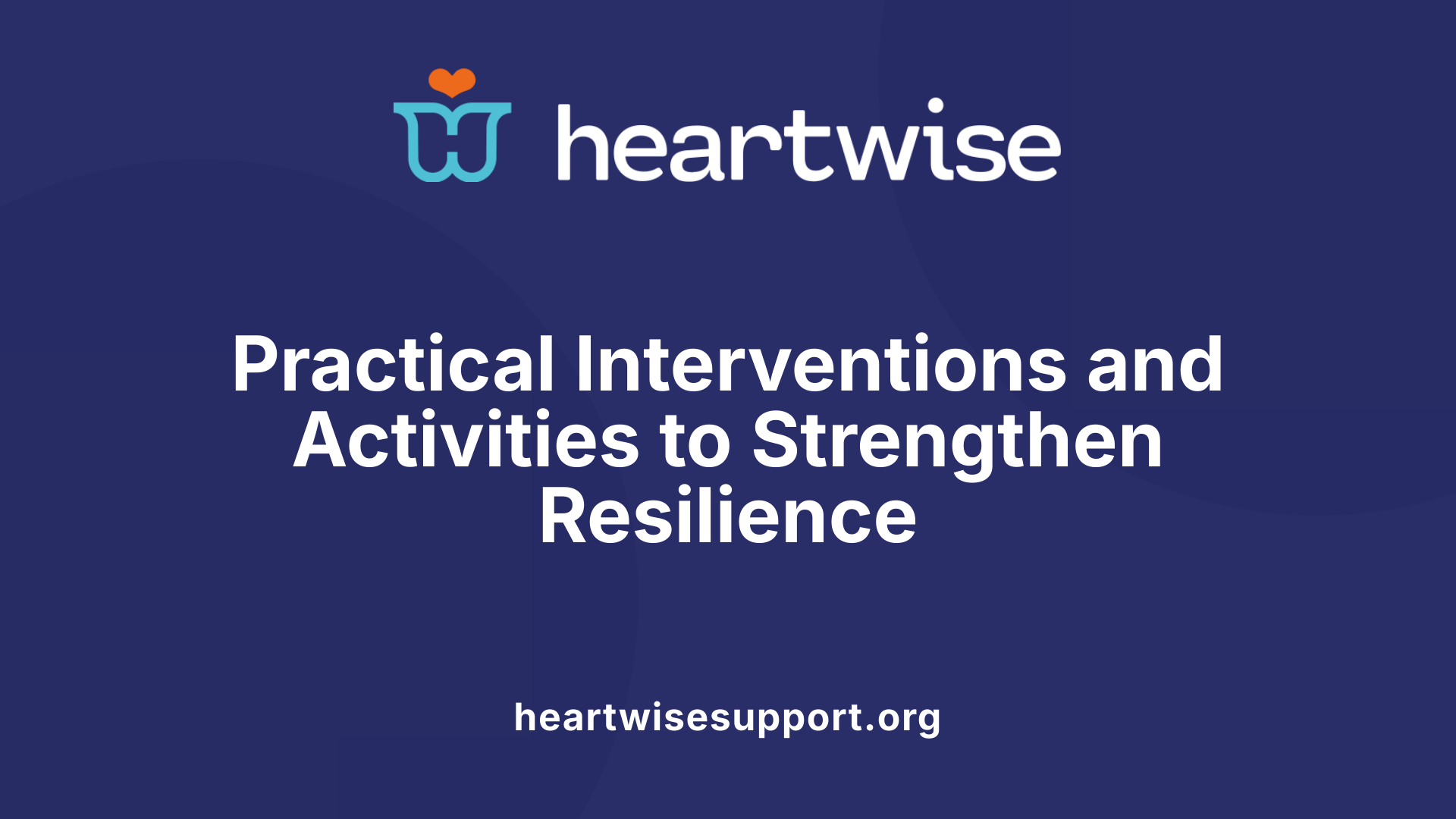Understanding resilience as a cornerstone of mental health
Resilience is the dynamic capacity to adapt, recover, and grow in the face of life's inevitable challenges. It acts as a protective factor against mental health conditions such as depression and anxiety, helping individuals manage stress effectively. Because resilience influences emotional and psychological well-being, it has become a focal point in mental health therapy, which aims to develop and reinforce this vital quality through deliberate strategies. Understanding what resilience entails and how therapy can facilitate its growth highlights the importance of targeted interventions that empower individuals to thrive despite adversity.
The Core Concept of Resilience and Its Significance

What is resilience and why is it important for mental health?
Resilience is the ability to adapt, recover, and even grow in response to life's setbacks and hardships. It is often described as a process that involves behaviors, thoughts, and actions that anyone can learn and develop over time.
This capacity is crucial for mental health because it helps individuals effectively manage stress, prevent mental health conditions such as depression and anxiety, and recover from adversity more quickly. When resilient, people are better equipped to face challenges like job loss, illness, or grief without becoming overwhelmed.
Building resilience involves various skills and habits. For example, maintaining supportive relationships, making meaningful daily goals, practicing self-care, and learning from experiences all contribute to strengthened resilience. It is important to understand that resilience is not a fixed trait—it can be cultivated and enhanced through deliberate effort.
Strategies such as fostering optimism, staying hopeful, practicing mindfulness, and seeking professional help when needed are effective ways to boost resilience. Psychological research shows that resilient individuals tend to have a positive outlook, flexibility in thinking, and strong social connections.
Overall, resilience serves as a vital resource for mental well-being. It enables people to not just survive difficulties, but also to grow through their experiences, leading to improved emotional strength and life satisfaction. Developing resilience allows individuals to better navigate the inevitable stresses of life and emerge stronger, healthier, and more capable of facing future challenges.
In summary, resilience acts as both a protective factor and a dynamic skill that supports mental health, making it one of the most important aspects of psychological well-being.
Strategies and Techniques for Building Resilience in Therapy

What strategies can help develop resilience through mental health therapy?
Building resilience is a dynamic process that can be significantly enhanced through targeted therapeutic approaches. Therapists utilize a variety of techniques to help individuals develop skills such as emotional regulation, problem-solving, and positive thinking patterns.
Core approaches like Cognitive Behavioral Therapy (CBT), Acceptance and Commitment Therapy (ACT), and specialized resilience counseling are designed to foster these skills. CBT, for example, helps clients recognize and challenge negative thought cycles, replacing them with healthier perspectives. This cognitive reframing encourages individuals to interpret stressors differently, reducing their emotional impact.
ACT emphasizes accepting difficult emotions while committing to actions aligned with personal values. It cultivates psychological flexibility, allowing clients to adapt more effectively to life's challenges. Resilience counseling integrates elements from positive psychology and mindfulness to promote inner strength and resourcefulness.
A vital part of resilience-building involves understanding one’s existing capacity for resilience. Revisiting past experiences of overcoming adversity can reinforce confidence and highlight personal strengths. Reflecting on previous successes and setbacks helps clients recognize patterns and develop strategies to face future challenges.
Setting realistic goals in therapy also plays an essential role. With professional guidance, individuals learn to break down larger problems into manageable steps, encouraging a sense of control and agency.
Beyond professional techniques, fostering social connections, engaging in self-care routines, and taking proactive steps are practical ways to bolster resilience. Support networks provide emotional safety nets, while regular self-care—such as physical activity, mindfulness, and healthy habits—strengthens overall well-being.
Overall, mental health therapy offers a comprehensive toolkit aimed at cultivating resilience at personal and interpersonal levels. These strategies empower individuals to navigate setbacks more effectively, turning adversity into opportunities for growth.
How Therapy Enhances Emotional Well-being and Resilience

How does therapy contribute to improving emotional well-being and resilience?
Therapy plays a crucial role in boosting emotional well-being by equipping individuals with essential skills for managing difficult emotions and overcoming setbacks. One of its primary benefits is helping clients develop emotional regulation, which is vital in conditions like anxiety, depression, and borderline personality disorder. By creating a safe space, therapy allows individuals to explore underlying causes of distress, express feelings, and practice coping strategies.
Therapeutic approaches such as Acceptance and Commitment Therapy (ACT) and Dialectical Behavior Therapy (DBT) are particularly effective in fostering resilience. ACT emphasizes accepting one’s feelings and clarifying personal values, encouraging active engagement in meaningful activities despite emotional discomfort. Meanwhile, DBT focuses on mindfulness, emotional regulation, distress tolerance, and interpersonal effectiveness, directly build emotional strength.
Additionally, therapy promotes self-awareness, helping clients recognize thought patterns and beliefs that hinder or help resilience. It enhances communication skills, enabling better relationships and social support, which are vital protective factors.
Through personalized techniques and ongoing support, therapy assists individuals in managing stress and adversity more effectively. It fosters psychological flexibility—the ability to adapt to changing circumstances and bounce back from challenges. Overall, therapy provides not only immediate relief but also strengthens long-term mental resilience, empowering people to thrive despite life’s difficulties.
Interventions and Activities to Foster Resilience
 Resilience counseling involves a variety of techniques and activities aimed at strengthening an individual's ability to cope with life's challenges. One of the foundational approaches is psychoeducation, which helps individuals understand the nature of resilience, recognize stress and emotional patterns, and learn about the factors that support mental strength.
Resilience counseling involves a variety of techniques and activities aimed at strengthening an individual's ability to cope with life's challenges. One of the foundational approaches is psychoeducation, which helps individuals understand the nature of resilience, recognize stress and emotional patterns, and learn about the factors that support mental strength.
Assessment tools like resilience scales—such as the Connor‐Davidson Resilience Scale (CD-RISC)—are used to evaluate current resilience levels and identify areas for growth. Based on these assessments, personalized resilience plans are developed, outlining specific goals, strategies, and skills for each individual.
Various evidence-based activities play a crucial role in resilience training. Visualization exercises, such as imagining oneself overcoming adversity, boost confidence and mental preparedness. Reviewing past successes encourages positive self-reflection and reminds individuals of their strength during difficult times.
Developing a growth mindset is another vital activity. It involves reframing failures and setbacks as opportunities for learning and growth, fostering optimism and persistence.
Group sessions offer additional benefits by creating shared experiences where participants can learn from others, exchange support, and build social bonds—an essential factor in resilience.
What are some techniques and interventions used in resilience counseling?
Resilience counseling employs a variety of strategies to cultivate emotional flexibility and mental strength. Core techniques include cognitive-behavioral therapy (CBT), which targets negative thought patterns; acceptance and commitment therapy (ACT), which promotes psychological flexibility; mindfulness practices, such as meditation and breathing exercises, to enhance present-moment awareness; and strengths-based approaches that leverage personal resources.
Interventions often integrate problem-solving training and stress inoculation, preparing individuals to manage stress proactively. Activities like visualization of a resilient self, reviewing past successes, and creating personalized resilience plans reinforce learning and adaptation.
Overall, these techniques aim to modify psychological and social factors, fostering a mindset geared toward resilience and well-being. Incorporating these strategies into counseling programs can help individuals build lasting emotional strength, manage adversity effectively, and foster a hopeful outlook for the future.
Benefits of Building Resilience for Mental and Physical Health
What are the benefits of building resilience for mental health and overall well-being?
Building resilience provides numerous advantages for mental health by enhancing individuals' capacity to adapt, recover, and grow amidst life's challenges. It reduces the likelihood of developing conditions such as depression and anxiety by fostering emotional stability and effective stress management.
Resilience encourages positive thinking and problem-solving skills, helping individuals interpret setbacks as opportunities for growth. This mental flexibility promotes a more optimistic outlook, which is essential for maintaining overall happiness and satisfaction.
Moreover, resilience supports physical health significantly. It strengthens the immune system and encourages healthy lifestyle choices, including regular exercise, balanced nutrition, and adequate sleep. Resilient individuals tend to seek social support more readily and engage in health-promoting behaviors.
The development of resilience also enhances self-efficacy—the belief in one's ability to influence events and outcomes. This, in turn, improves self-confidence and social relationships.
In essence, building resilience equips people to handle stress effectively, improve their emotional well-being, and maintain good physical health. It fosters a sense of purpose, optimism, and connectedness, all of which contribute to a more balanced and fulfilling life.
The Scientific Evidence Supporting Resilience Interventions
Research studies and meta-analyses provide robust evidence for the effectiveness of therapies aimed at building resilience. For example, comprehensive reviews of randomized controlled trials have consistently shown that interventions such as cognitive-behavioral therapy (CBT), dialectical behavior therapy (DBT), and problem-solving therapy considerably improve resilience levels. These therapies focus on fostering adaptive thinking patterns, emotional regulation, and social skills, which are crucial for handling stress and adversity.
Meta-analyses reveal that participants in resilience-focused therapy programs experience a notable reduction in depression, anxiety, and burnout, with improvements often maintained long-term. The systematic review of these studies underscores the importance of targeting modifiable resilience factors, including active problem solving, social connection, and fostering a growth mindset.
Biological research complements these findings. Resilience-enhancing therapies have been linked to neuroplasticity—the brain's ability to reorganize and form new connections—which underpins emotional flexibility and recovery. Additionally, reductions in systemic inflammation and oxidative stress, both associated with mental health conditions, are observed following resilience-oriented interventions.
Empirical evidence indicates that increasing resilience through psychotherapy not only improves emotional well-being but also bolsters physical health, lowering vulnerability to stress-related illnesses. These findings demonstrate that resilience-building is a scientifically supported approach to enhancing mental health, grounded in both psychological and biological mechanisms.
Fostering lifelong resilience for mental wellness
Building resilience through mental health therapy offers profound benefits for emotional stability, physical health, and overall life satisfaction. By cultivating skills such as emotional regulation, adaptive thinking, and supportive relationships, individuals can better navigate adversity and emerge stronger. Evidence-based therapies like CBT, ACT, and resilience coaching provide practical tools and interventions rooted in scientific research, emphasizing the modifiable nature of resilience. As our understanding of the biological and psychological underpinnings of resilience deepens, integrating these insights into therapeutic practices holds promise for more personalized and effective mental health support. Ultimately, fostering resilience is a lifelong journey—one that empowers individuals to face life's uncertainties with confidence, hope, and purpose.
References
- Resilience: Build skills to endure hardship - Mayo Clinic
- Resilience Counseling: 12 Worksheets to Use in Therapy
- Building your resilience - American Psychological Association
- Building Personal Resilience: Managing Anxiety and Mental Health
- [PDF] Building Resiliency for Clients with Mental Health, Cognitive and ...
- Managing stress and building resilience - tips - Mind
- Building Resilience | NAMI
- Building resilience through psychotherapy - PMC











